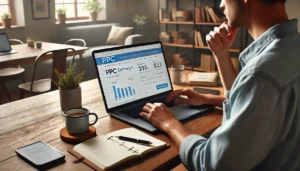Is PPC Advertising Effective for Small Businesses?

Is PPC Advertising Effective for Small Businesses? Pay-Per-Click (PPC) advertising can be a game-changer for small businesses. It lets you target your audience and only pay when someone clicks on your ad. This can help you get more customers without spending too much money. In this article, we’ll explore how PPC works, its benefits, and tips for creating effective PPC campaigns.
Key Takeaways
- PPC advertising allows small businesses to target specific audiences and only pay for actual clicks.
- It offers quick visibility and can drive immediate traffic to your website.
- PPC campaigns are cost-effective and can deliver a high return on investment (ROI).
- Using PPC, you can track and measure your campaign’s success in real time.
- PPC works well with other marketing strategies like SEO and social media.
Understanding PPC Advertising for Small Businesses
What is PPC Advertising?
PPC (Pay-Per-Click) advertising is a method where businesses pay a fee each time their ad is clicked. It’s a way of buying visits to your site rather than earning them organically. Google ads PPC and other platforms like Bing Ads are popular choices for small businesses. This model allows you to target specific audiences and only pay when someone shows interest by clicking on your ad.
How Does PPC Work?
PPC works by bidding on keywords relevant to your business. When someone searches for those keywords, your ad may appear in the search results. If they click on your ad, you pay the amount you bid. This system ensures that your ads are shown to people actively searching for what you offer. A London PPC agency can help you set up and manage these campaigns effectively.
Key Terms in PPC Advertising
Understanding key terms in PPC is crucial for success. Here are some important ones:
- CPC (Cost-Per-Click): The amount you pay for each click on your ad.
- CTR (Click-Through Rate): The percentage of people who click your ad after seeing it.
- Quality Score: A score given by Google that affects your ad’s position and cost.
- Conversion Rate: The percentage of clicks that result in a desired action, like a purchase.
Knowing these terms can help you better understand and optimise your PPC campaigns, whether you’re working with a PPC ad agency or managing it yourself.
By grasping these basics, you can make informed decisions and set the stage for a successful PPC strategy. Whether you’re using Google Adwords PPC or another platform, the principles remain the same. This knowledge is the foundation for leveraging PPC to grow your small business, especially in competitive fields like eCommerce PPC.
Is PPC Advertising Effective for Small Businesses? Knowing the Benefits
Immediate Visibility and Traffic
One of the biggest advantages of PPC advertising is the immediate visibility it offers. Unlike organic methods, which can take months to show results, PPC ads can start driving traffic to your website as soon as they go live. This quick entry can be a game-changer for small businesses looking to make an immediate impact.
Cost-Effectiveness and ROI (Is PPC Advertising Effective for Small Businesses?)
PPC advertising allows you to set a budget that fits your financial capabilities. You only pay when someone clicks on your ad, making it a cost-effective way to reach potential customers. With proper optimisation, the return on investment (ROI) can be substantial. Small businesses can compete with larger companies without breaking the bank.
Measurable and Trackable Results
One of the standout features of PPC advertising is its measurability. You can track impressions, clicks, and conversions in real-time. This data allows you to adjust your campaigns for better performance. The ability to measure results helps small businesses make informed decisions and optimise their marketing strategies effectively.
PPC advertising provides a wealth of useful data that can be leveraged to improve other marketing channels. This makes it an invaluable tool for small businesses aiming for growth.
Is PPC Advertising Effective for Small Businesses? Creating Effective PPC Campaigns
Keyword Research and Selection
To create a successful PPC campaign, start with thorough keyword research. Use tools like Google Keyword Planner to find relevant keywords for your business. Focus on long-tail keywords, as they often have less competition and can be more cost-effective. Regularly update your keyword list to include new terms that potential customers might use.
Crafting Compelling Ad Copy (Is PPC Advertising Effective for Small Businesses?)
Your ad copy needs to grab attention and encourage clicks. Write clear, concise, and compelling headlines. Include a strong call-to-action (CTA) to guide users on what to do next. Test different versions of your ad copy to see which performs best. Remember, Google advertising agencies can help you refine your messaging.
Setting Up Conversion Tracking
Conversion tracking is crucial for measuring the success of your PPC campaigns. Set up tracking in Google Ads to monitor actions like purchases, sign-ups, or contact form submissions. This data helps you understand which ads are driving results and where to adjust your strategy. Don’t forget to regularly review and optimise your tracking setup to ensure accuracy.
Effective PPC campaigns require ongoing management and optimisation. By focusing on the right keywords, crafting compelling ads, and tracking conversions, you can maximise your ROI and grow your business.
Is PPC Advertising Effective for Small Businesses? Common Challenges
Budget Management
Managing your PPC budget can be tricky. It’s easy to overspend if you’re not careful. Regularly reviewing your spending and adjusting bids is crucial. Use tools like a Google ads audit to keep track of where your money is going. This helps you avoid wasting funds on underperforming keywords.
Competition with Larger Companies (Is PPC Advertising Effective for Small Businesses?)
Small businesses often find themselves competing with larger companies that have bigger budgets. This can make it hard to get your ads seen. Focus on niche keywords and local targeting to level the playing field. Long-tail keywords can also help you stand out without breaking the bank.
Ad Fatigue and Banner Blindness
Over time, your audience may become blind to your ads, a phenomenon known as ad fatigue. Rotate your ad creatives and update your messaging regularly to keep things fresh. This not only captures attention but also improves your click-through rates.
PPC advertising is not a set-it-and-forget-it strategy. Continuous monitoring and tweaking are essential for sustained success.
PPC Advertising Tips for Small Businesses
Starting with a Simple Campaign
When you’re new to PPC advertising, it’s wise to begin with a straightforward campaign. Focus on a small set of keywords and a limited budget. This approach allows you to test the waters without overwhelming yourself. As you gain confidence, you can gradually expand your efforts.
Utilising Negative Keywords (Is PPC Advertising Effective for Small Businesses?)
Negative keywords are essential for refining your PPC campaigns. By excluding irrelevant search terms, you ensure your ads reach the right audience. This not only improves your click-through rate but also maximises your budget efficiency. Regularly perform a PPC audit to identify and add negative keywords.
Optimising Landing Pages
Your landing page is where potential customers decide to take action. Ensure it is optimised for conversions by having a clear call-to-action, relevant content, and fast loading times. A well-optimised landing page can significantly boost your ROI and make your PPC management more effective.
Remember, a well-structured PPC campaign can drive significant traffic and conversions, but it requires ongoing optimisation and monitoring.
By following these tips, small businesses can create effective PPC campaigns that drive results. Whether you manage your campaigns in-house or work with a PPC agency, these strategies will help you make the most of your advertising budget.
Is PPC Advertising Effective for Small Businesses? Integrating PPC with Other Marketing Strategies
Combining PPC with SEO
When you invest time or money into keyword or blog topic research for SEO, PPC can be a great complement. Your keyword research can serve both areas: you can identify search terms that are a good fit for your business but too competitive to rank for organically, and instead, try to buy in. Additionally, you’ll discover new, related search terms that can inspire new blog posts.
Leveraging Social Media (Is PPC Advertising Effective for Small Businesses?)
PPC works well with other marketing channels and provides a wealth of useful data. Small businesses can benefit greatly from this type of advertising due to its ability to drive traffic, conversions, and ultimately revenue. By integrating PPC with your social media efforts, you can target a specific audience with tailored ads and only pay for the clicks received. This approach helps small businesses compete with larger firms, generate leads and sales, and increase brand awareness affordably.
Using PPC Data for Email Marketing
PPC analytics can help you spot low-performing ads that aren’t getting clicks or driving conversions. Run A/B tests to figure out how to boost those metrics. For example, you may test two different CTAs like “buy now” or “get your copy” on a digital download to see which option performs better. The data gathered from these tests can be used to refine your email marketing strategies, ensuring that your messages are as effective as possible.
Pro Tip: Use PPC data to identify high-performing keywords and incorporate them into your email subject lines and content to increase open and click-through rates.
Is PPC Advertising Effective for Small Businesses? Evaluating the Success of Your PPC Campaigns
Analysing Key Metrics
To gauge the effectiveness of your PPC campaigns, you need to dive into key metrics. Click-Through Rate (CTR) is crucial as it shows how often people click on your ad after seeing it. A high CTR indicates that your ad is relevant and engaging. Another important metric is Conversion Rate, which tells you the percentage of clicks that result in a desired action, like a purchase or sign-up. Keep an eye on Cost Per Click (CPC) and Return on Ad Spend (ROAS) to ensure you’re getting value for your money.
Adjusting Strategies Based on Performance (Is PPC Advertising Effective for Small Businesses?)
Once you have the data, it’s time to make adjustments. If certain keywords are underperforming, consider pausing them to save your budget. You can also split your ad groups into smaller, more targeted clusters to improve relevance and boost your Quality Score. Running A/B tests on different ad copies or landing pages can help you identify what resonates best with your audience.
Tools for Monitoring PPC Campaigns
There are several tools available to help you monitor your PPC campaigns effectively. Google Analytics and Google Ads are essential for tracking performance and gathering insights. Other tools like SEMrush and Ahrefs can provide competitive analysis and keyword research. These tools can help you spot low-performing ads and identify opportunities for improvement.
Regularly reviewing and adjusting your PPC campaigns is key to long-term success. Use the data to make informed decisions and continually optimise your strategy.
Conclusion
In conclusion, PPC advertising can be a powerful tool for small businesses when used correctly. It allows you to target your audience precisely and only pay for actual clicks, making it a cost-effective way to boost visibility and drive traffic. While it does require some research and ongoing optimisation, the potential benefits, such as increased brand awareness and higher sales, make it worth the effort. By following best practices and continuously refining your approach, small businesses can compete with larger companies and achieve significant growth through PPC advertising.
Frequently Asked Questions
Does PPC work for small businesses?
Yes, PPC (Pay-Per-Click) advertising can be very effective for small businesses. It lets them target their audience specifically and only pay when someone clicks on the ad. This can lead to a better return on investment and helps small businesses compete with bigger companies.
How do I make a good PPC ad?
To make a good PPC ad, you need to do research, optimise your ads, and test different versions. Start with a simple campaign, choose the right keywords, and write compelling ad copy. Also, make sure to track your results and make adjustments as needed.
What is PPC marketing for small businesses?
PPC marketing for small businesses is an online advertising method where businesses place ads on platforms like Google Ads and only pay when a user clicks on their ad. This helps drive traffic, increase visibility, and lead to conversions by targeting specific keywords and audiences.
What are the benefits of PPC for small businesses?
PPC offers quick entry into online advertising, even if you’re new to it. It’s also measurable and trackable, so you can see performance details like impressions, clicks, and conversions. This helps small businesses optimise their campaigns and get better results.
What is the downside to PPC marketing?
One downside to PPC marketing is that it can be expensive, especially if you’re targeting highly competitive keywords. It’s also time-consuming to manage and optimise your campaigns. If not done correctly, you might end up spending a lot without getting good results.
How can PPC work with other marketing strategies?
PPC works well with other marketing strategies like SEO, social media, and email marketing. You can use PPC data to improve your SEO efforts, reach more people on social media, and create targeted email campaigns. Combining these strategies can help you get better overall results.
Author
Search Blog
Free PPC Audit
Subscribe to our Newsletter
The Voices of Our Success: Your Words, Our Pride
Don't just take our word for it. With over 100+ five-star reviews, we let our work-and our satisfied clients-speak for us.
"We have been working with PPC Geeks for around 6 months and have found Mark and the team to be very impressive. Having worked with a few companies in this and similar sectors, I rate PPC Geeks as the strongest I have come across. They have taken time to understand our business, our market and competitors and supported us to devise a strategy to generate business. I value the expertise Mark and his team provide and trust them to make the best recommendations for the long-term."
~ Just Go, Alasdair Anderson




